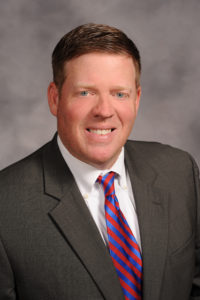We are six weeks out from the end of the legislative session which means we are two weeks away from what is often referred too as the “silly season.”
The last four weeks of session is when bills come out of nowhere, and it seems, at times, like there aren’t any rules.
I don’t necessarily intend to speak negatively of this portion of session, as we’ve used this period in the past to get bills passed. It’s just we are in a heightened awareness during the final month as we have several bills we are monitoring and always fearful of new language being added that will turn a good bill bad.

One bill we aren’t as worried about this year is the “gun” bill. I’ve spent a lot time talking about this bill over the past year, and it was finally killed in committee in mid-April. The good news that comes with this bill being killed is the sponsors supporting the measure won’t be able to bring this exact language back for two years.
There are other bills we are involved in and will continue to monitor. Look for a full wrap-up of everything that happened this session in the June edition of the Oklahoma Banker.
• • •
Things are moving fast at the federal level with the majority of the action a result of the SVB and Signature Bank issues.
There has been constant talk about the need for legislation to address what happened, but the stance of the OBA and the ABA is to wait and gather all necessary information before running shotgun legislation.
We all know a knee-jerk reaction with legislation rarely – if ever – reaches its intended target. It usually just results in a mountain of unintended consequences.
With that being said, some elected officials in D.C. still couldn’t introduce legislation fast enough.
H.R. 1602 & S. 817
Sen. Elizabeth Warren and Rep. Katie Porter introduced legislation that would repeal Title IV of S.2155.
Sec. 401 — Amends the Financial Stability Act of 2010, with respect to non-bank financial companies supervised by the FRB and certain bank holding companies to:
Increase the asset threshold at which certain enhanced prudential standards shall apply, from $50 billion to $250 billion, while allowing the FRB discretion in determining whether a financial institution with assets equal or greater than $100 billion must be subject to such standards;
Increase the asset threshold at which company-run stress tests are required, from $10 billion to $250 billion; and
Increase the asset threshold for mandatory risk committees, from $10 billion to $50 billion.
S. 915
Sen. Warren and Sen. Rick Scott unveiled legislation that would require an independent inspector general, who would be appointed by the president and confirmed by the Senate, to oversee the Federal Reserve Board and the CFPB.
S.825
Sen. Josh Hawley and Sen. Mike Braun introduced a bill that would prevent the FDIC from levying special assessments on community banks, bar banks from passing the cost of a special assessment by the FDIC to their customers, and all the FDIC to claw back bonuses paid to executives of failed banks.
• • •
On March 30, the CFPB finalized its long-awaited Section 1071 rule, aimed at transforming small business lending reporting.
Section 1071 of the Dodd-Frank Act requires the collection and reporting of credit application data for small businesses, including women-owned and minority-owned small businesses.
The final rule covers closed-end loans, lines of credit, business credit cards, online credit products and merchant cash advances. This rule applies to banks, credit unions and nonbank lenders.
Under the final rule, a “small business” is defined as one with gross revenue $5M in the last fiscal year. Small businesses will be able to self-identify as women, minority or LGBTQI+ owned. Loan officers will not be required to make their own determinations of an applicant’s race, ethnicity or any other demographic information.
Lenders that originate at least 2,500 small business loans annually must collect data starting Oct. 1, 2024.
Lenders that originate at least 500 loans annually must collect data starting April 1, 2025.
Lenders that originate at least 100 loans annually must collect data starting Jan. 1, 2026.
Lenders originating less than 100 loans per year will still be required to adhere to fair lending laws.
• • •
The OBA Annual Convention is right around the corner and we want you there.
This year’s convention will be May 8-10 at the Embassy Suites in Norman. We have lots of great speakers including Rob Nichols, president and CEO of the American Bankers Association, as well as Acting Comptroller of the Currency Michael Hsu.
The convention will be a great opportunity see old friends and gather some of the latest information on what’s going on in Oklahoma banking.
I hope to see you there!
 Oklahoma Bankers Association We make bankers better!
Oklahoma Bankers Association We make bankers better!
